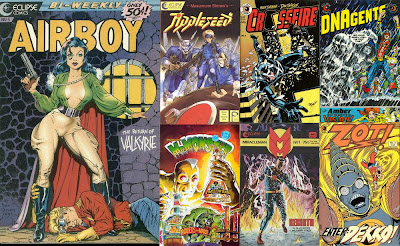 |
| Sabre (Eclipse; Aug.1978) |
This week’s multiple nominees were always intended to be offered in tandem, and they present a fine example for why I selected a triumvirate of publishers to represent the ambitious explosion of publishers who jumped into comic book specialty shops during the 1980’s. Eclipse Comics, First Comics & Pacific Comics were just three of the many innovative, complex and independent comic publishers who did their very best to – in effect – create an entirely new golden age at the dawn of the direct only market. Other notable publishers whose heyday occurred in the halcyon days of the 80s include Aardvark-Vanaheim, Capital, Comico, Slave Labor, Caliber, Malibu and WaRP Graphics. Some like Fantagraphics and Dark Horse have endured until now, but these three enjoyed a high degree of cross-pollination in their runs that bound them together in a sense.
First Comics took early advantage of the growing direct market, attracting a number of writers and artists from DC and Marvel including Frank Brunner, Mike Grell, Howard Chaykin, Joe Staton, Steven Grant, Timothy Truman and Jim Starlin, to introduce their own creator-owned titles, which, not being subject to the Comics Code Authority, were free to feature more mature content. In 1984, First acquired all the titles of the short-lived publisher Capital Comics, including Mike Baron's action/superhero/fantasy/comedy series The Badger and Baron and Steve Rude’s space-faring superhero series Nexus. First was also known for initiating an anti-competitive activities lawsuit against Marvel Comics and World Color Press, being at the forefront of an industry-wide debate about creators' rights, experimenting with newsstand distribution and the revival of Classics Illustrated. First Comics ceased publishing in 1991.
Bill and Steve Schanes launched Pacific Comics in 1981, out of their existing west coast chain of comic’s shops and distribution business. They initially enticed comics’ creator Jack “King” Kirby, who they had befriended over the years, into providing Pacific with Captain Victory and the Galactic Rangers, assuring him that he could keep full ownership and copyrights and that they were only interested in the publishing rights. Before long, Pacific had attracted the attention of other comics professionals, including Mike Grell (who recalls that he was actually the first to sign with Pacific by a couple of weeks, but that Kirby's work was published first because he "delivered his first.") who had planned for his Starslayer to appear from DC, but after it was dropped from the their publishing schedule, the brothers approached him about releasing it. Creators whose work appeared at Pacific include Dave Stevens, Steve Ditko, Art Adams, John Bolton, Bill Wray, Roy Thomas, P. Craig Russell and Michael T. Gilbert. Pacific is credited with bringing back 3-D to comics, a fleeting trend in the 1950s that had then been stymied by poor printing separations. Ray Zone was hired to do the production work. The distribution arm of Pacific began suffering serious problems in 1984, due in part to overly-generous credit extensions to retailers, who didn’t pay back as expected. A crowded market, loss of select titles that moved to other publishers and rival distributors purchasing stock from Pacific in order to push them out of the market, ultimately aborted Pacific Comics short but sweet existence. The brothers threw in the towel in 1984.
Visit Gal Gadot for Daily Updated Hairstyles Collection


